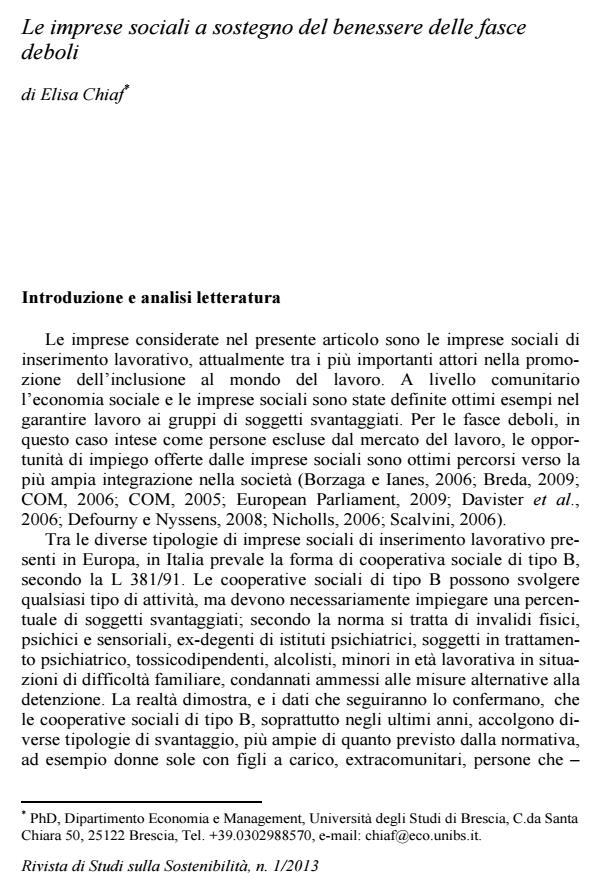Social enterprises to support the well-being of vulnerable people
Journal title RIVISTA DI STUDI SULLA SOSTENIBILITA'
Author/s Elisa Chiaf
Publishing Year 2013 Issue 2013/1 Language Italian
Pages 18 P. 163-180 File size 261 KB
DOI 10.3280/RISS2013-001013
DOI is like a bar code for intellectual property: to have more infomation
click here
Below, you can see the article first page
If you want to buy this article in PDF format, you can do it, following the instructions to buy download credits

FrancoAngeli is member of Publishers International Linking Association, Inc (PILA), a not-for-profit association which run the CrossRef service enabling links to and from online scholarly content.
The goal of this article is the analysis of the well-being of workers in social cooperatives of type B, which, according to L 381/91, aim at providing employment for disadvantaged people. The goal of the article is to analyse whether and to what extent cooperatives’ disadvantaged workers are benefiting, from a psychophysical, relational and economical point of view, from the period of work insertion in the social cooperative. The research is conducted through the methodology of the questionnaire and on a sample of 285 subjects, placed in 29 social cooperatives operating in the Province of Brescia. It is believed that the results obtained are demonstrating the support of well-being generated by social enterprises towards their employees, even when they are vulnerable.
Keywords: Social Enterprise, Job Insertion, Worker, Disadvantage, Well-being, Evaluation
- Venturi P., Zandonai F. (2012) (a cura di). L’impresa sociale in Italia. Pluralità dei modelli e contributo alla ripresa. Rapporto Iris Network. Milano: Altreconomia.
- Borzaga C., Ianes A. (2006). L’economia della solidarietà. Roma: Donzelli.
- Borzaga C., Zandonai F., (2009) (a cura di). L’impresa sociale in Italia. Economia ed istituzioni dei beni comuni. Roma: Donzelli.
- Borzaga C. (2012). Lo svantaggio sul mercato del lavoro: i fallimenti di Stato e mercato e la proposta del non profit. In: Depedri S. (a cura di). L’inclusione efficiente. Milano: FrancoAngeli.
- Breda J. (2009). Work Integration Social Enterprises in EU. Testo disponibilie al sito: http//www.euricse.eu.
- Carpita M., Manisera M. (2007). Motivazioni, atteggiamenti ed incentivi non economici del lavoro nelle cooperative sociali. Impresa Sociale, 76, 3: 173-192.
- COM (2006) 44 final. Concerning a consultation on action at EU level to promote the active inclusion of the people furthest from the labour market.
- COM (2005). Commission Report on Employment in Europe 2005. Recent Trends and Prospects.
- Davister C., Defourny J., Gregoire O. (2006). Le imprese sociali di inserimento lavorativo nell’UE: i modelli. Impresa Sociale, 75, 1: 57-81.
- Defourny J., Nyssens M. (2008). Social Enterprise in Europe: recent trends and developments. Emes Working Paper, 01, 2008.
- Depedri S. (2007). Livelli di soddisfazione e fedeltà dei lavoratori, Impresa Sociale, 76, 3: 193-210.
- Depedri S. (2012a). Le metodologie per la valutazione dell’inserimento di persone svantaggiate. In: Depedri S. (a cura di). L’inclusione efficiente. Milano: FrancoAngeli.
- Depedri S. (2012b). I lavoratori ordinari: svantaggio diffuso e motivazioni al lavoro. In: Depedri S. (a cura di). L’inclusione efficiente. Milano: FrancoAngeli.
- European Parliament, Committee on Employment and Social Affairs (2008/2250(INI)). Report on Social Economy.
- Kieselbach T. (1997). Unemployment, victimization, and perceived injustices: Future perspectives for coping with occupational transition processes. In: Kieselbach T. (a cura di). Job loss, unemployment, and social injustices (special issue). Social Justice Research, 10, 2: 127-151.
- Nicholls A. (2006) (a cura di). Social Entrepreneurship. New Models of Sustainable Social Change. Oxford: Oxford University Press.
- Scalvini F. (2006). La cooperazione sociale di inserimento lavorativo. Impresa Sociale, 75, 1: 21-29.
- Tortia E. (2007). Rapporto contrattuale, aspetti relazionali ed equità percepita. Impresa Sociale, 76, 3: 211-225.
- Zaniboni S., Fraccaroli F., Villotti P., Corbière M. (2011). Working plans of people with mental disorders employed in Italian Social Enterprises. Psychiatric Rehabilitation Journal, 35,1: 55-58, DOI: 10.2975/35.1.2011.55.58
Elisa Chiaf, Le imprese sociali a sostegno del benessere delle fasce deboli in "RIVISTA DI STUDI SULLA SOSTENIBILITA'" 1/2013, pp 163-180, DOI: 10.3280/RISS2013-001013